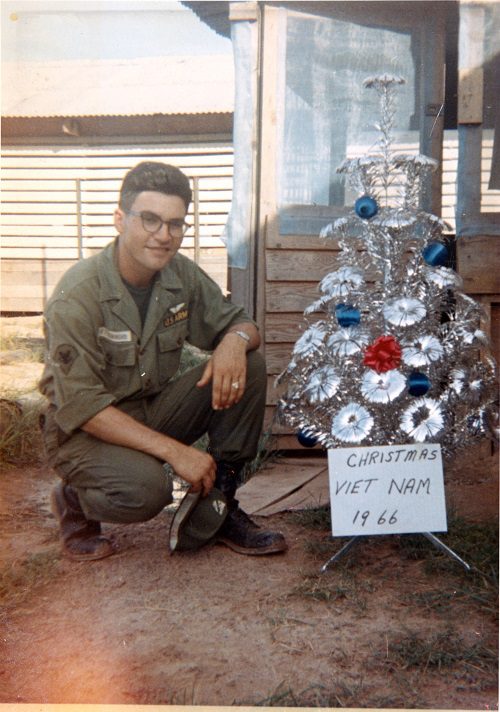
Photo of William Rettenmund in Vietnam 1966. Fellow soldier Bob Nolan's family in Ohio sent the Christmas tree to Vietnam. Rettenmund recounted that more than one soldier posed by it, and his family really enjoyed getting this picture. He also remembered that it made Christmas more real, and his helicopter company stood down that day and sang Christmas carols. Rettenmund returned home on January 9, 1967. WVM.1231.I037.
Serving in the United States military over the holiday season brings back poignant memories for Wisconsin veterans. When asked, they remember the place and what was happening at that time, usually more clearly than the normal day-to-day. They also reexperience the feelings and emotions felt at that time. Oral history interviews excel in capturing sentiments lost to other forms of history.
Military members deployed during the holidays are often separated from their families, and quality time spent with the family over the holidays is often treasured. Service people also connect with local communities over the holidays, sing together, eat together, or celebrate together in challenging situations. Serving during the holidays and adapting to challenging conditions is a coping mechanism necessary to survive holiday military service.
Here are some Wisconsin veterans and their holiday stories in their own words.
Singing Carols in Puerto Rico: Leda Zoroghlian Patrick
ZOROGHLIAN PATRICK: So that music passed on to the chow hall and people were listening to it and they were more interested about the lettuce. Every Christmas, we would get all the Latin music and we do the parrandas, and the parrandas is walking all around the hospital, singing [guytas??], which is the Christmas songs, and a lot of non-Latinos would join us, just to do the caravan, and they got more involved in the Latin culture, specifically in Christmas when we did the parrandas in the hospital. (Zoroghlian Patrick's complete interview)
Santa Claus in Vietnam: Larry Reed
REED: But on the other hand, the good news is we had a Vietnamese-American society in Saigon, officers and men and women, mostly women from Saigon, Vietnamese. We gathered together occasion to socialize, to get to know each other, and also to raise money for their orphanages and for their goodwill efforts. The American Vietnamese Society, the work we tried to do with families in Saigon and elsewhere, probably in the area. But of course, as an officer I didn't have a lot of time to do that, nor did any of us. But I remember one occasion that we we it was Christmas time and we raised some money and we bought a lot of things from the PX to bring to the orphanage near Tan Son Nhut airport, a Catholic orphanage. And the Vietnamese ladies and some of the officers gathered the material and went there and the big bags of gifts for the orphans. Unfortunately, it seemed like the entire city of Saigon, all the orphans and young kids in Saigon realized what was going on. So they also came to the orphanage near on Ton Son Nhut. We were swamped with young children wanting gifts, wanting something from the Americans, wanting the candy, wanting the little gifts we were giving out at the legitimate orphanage at Christmas time. And we were swamped. But we made a big mistake with the Air Force, with the Army, I guess, Air Force. And that was to have Santa Claus arrive to cheer up the kids. And the Santa was going to arrive by helicopter and land near the orphanage near Ton Son Nhut, a big open space, Well, the hundreds and hundreds of children that were handing out gifts from the chapel windows because we couldn't be outside. There were too many kids. We had opened the chapel windows and give the gifts out through the windows. We were swamped. Well, the kids saw this helicopter, the Army helicopter, landing near them. They panicked in fear. They thought that we were being assaulted by some helicopter and the children ran screaming away from the helicopter. So, of poor Santa Claus, we got off the helicopter and his red suit and big bag of gifts, the kids had scattered out of fear. They thought there was an assault going on, and they might be killed or injured. It was like a battle action scene, But, nobody got hurt. And the kids did come back when they realized just that jolly old St. Nick was there to hand out more gifts. But it was terrifying. You realize how much suffering went on, the children, the orphans and the people in that war. And that's the only time I confronted that idea that we were not succeeding, as it were, with the people. It was a guerilla war of the people, and we didn't have a handle on how to deal with the people in general. I can't be more specific than that. (Reed's complete interview)
Cold Turkey in Korea: Cornelius Hill
HILL: Because I think the fighting was just going in and pushing them back, and all of a sudden, we're north all the way to that Yalu River, and all of a sudden the Chinese came down then we were overrun. We was on the go, backing up all the way. I mean we would move. And they were going the way the crow flies and we would go and then by vehicle and going around the mountain until they, no more than stopped and they were right on us already again, so, we lost a lot of guys over there. I don't know, it was all messed up, we lost--all our food, our ammunition, C-rations, everything we had. As a matter of fact we was like on rice for about four or five weeks. I mean, whatever we could pick up on the way, that's what we was eating. We was even killing their oxen, using the meat with the rice and all that. That's why I don't eat rice no more [Laughs].
INTERVIEWER: So it was pretty chaotic?
HILL: It was, it was bad for awhile there. Even the aircrafts weren't hitting us. They were missing us, and then we'd never get any C-rations or anything, we was stealing C-rations off of tanks that were going by on us and you know, just to get something to eat. I think--what was it? I know there was one holiday, I think we got a Christmas dinner--it was either Christmas dinner or New Year's dinner in the middle of January. It was cold anyway. And it was at like, about one o' clock in the morning they brought hot chow to us--managed to get some hot chow to us somehow. And we was sitting there, eating cold turkey and whatever you know, whatever we could, well what we thought was cold turkey anyway though. It was dark out there you had to just feel your way around, and that was the only hot meal we got I think for a long time after that. (Hill's complete interview)
After Pearl Harbor: Charles Imbruglia
INTERVIEWER: How many days after Pearl Harbor?
IMBRUGLIA: Ten days after.
INTERVIEWER: Ten days.
IMBRUGLIA: They, uh -- So the whole fleet takes off. I don't know how many ships there were. There was --
INTERVIEWER: A bunch.
IMBRUGLIA: Quite a few.
INTERVIEWER: You had fourteen-inch big guns?
IMBRUGLIA: We had sixteen-inch guns.
INTERVIEWER: Sixteen, yeah.
IMBRUGLIA: So, we had Christmas; so this must have been more than ten days, because we had Christmas at sea, and Pearl Harbor was on the seventh. Yeah, because I still got my, uh, I still have that menu as to what we had for Christmas. The reason I kept that menu is because I got the autographs of all my friends and the band on there.
INTERVIEWER: Oh, I see.
IMBRUGLIA: So that's, that's uh -- [Dog barks] -- kind of a memory to go back and look at those names and try to remember who they were and why we were friends and so forth. I still have that menu. (Imbruglia's complete interview)
Spending Quality Time with Family: Shawn Corcoran
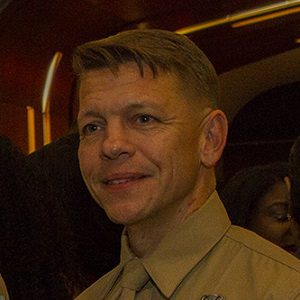
CORCORAN: We ended up coming home on a Christmas leave block. There was a two-week leave block then. I tried to get home as often as I could to spend time with the boys. I tried to get home every time I had vacation set up, or saved up, I'd come home. We accrued about two and a half days a month. So every time I had enough saved up, I'd fly home and stay with the boys. And we had a lot of quality time. Well, I ended up coming home for that Christmas, and I think it was Christmas of 2002. About a year later, now. I think it was about a year. Christmas, 2002, and I am home, and spending time with them. And we did, I want to make sure I have my dates right here. Yea, it was Christmas, 2002, and I end up getting a call on Christmas Eve, or on New Years Eve. From one of our platoon sergeants, saying that, hey, all sections leaders have to come back to LeJeune as quickly as possible. I had an inkling something was going on before I left. One of my buddies was telling me that, hey, the unit just put an order in for desert cammies. At the time this whole thing was boiling around about Iraq. (Corcoran's complete interview)
A Rough Voyage: Birney Dibble
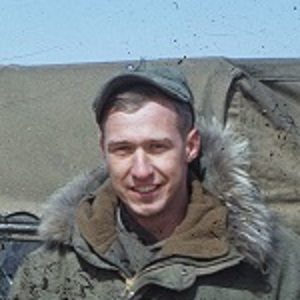
DIBBLE: The Weigel, the William Weigel. The general class ship, yep, 5,000 Marines, about 4,500 of the 500 doctors and corpsmen. Yeah that was quite a trip, nineteen days. We hit a uh, typhoon in the north Atlantic about two days out of Japan and that was an awful experience, because they had to head into the wind, and the bow of the ship would go way up and tons of water off the sides and then it would go down on the other side of the wave, and the twin screws would come out of the water, and the whole ship would just shake, just--[makes noise] and all except 600 of the 5,000 Marines were incapacitated, didn't even show up for Christmas dinner. We hit the storm on December twenty-third, which was Christmas Eve because we crossed the date line the next day. So, the next day was the twenty-fifth, and I was one of the 600 that--they asked us, there were two doctors ship's crew, Navy doctors, who asked me if I would--would all of us, there were only two or three of us that weren't sick, go down in the hold, and into the enlisted men's quarters, because they were lying in their tiered bunks, four or five on either side, and then when they vomited, they just vomited right on the floor and then there's scuppers on both sides, I don't know if you've ever been on any of those ships or not but--and so when the ship's prow would go up, the gutter would just run with vomit down the side. (Dibble's complete interview)
Our Christmas Tree in Iraq: Mark Anderson
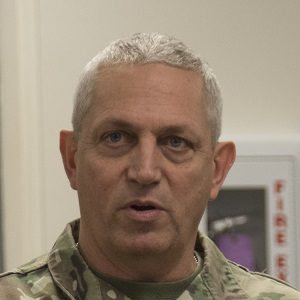
ANDERSON: And so Christmas comes, and of course it's just another day. Everybody tried to celebrate it in their own way. We did a little Christmas tree that we had found some-- like a pine bough. It was a Charlie Brown Christmas, it really was. Course, we didn't have anything to decorate it with, except what we had. So, it was decorated with an incendiary grenade, a frag grenade one of my knives, some bullets, and then somebody had sent us, like, a-- what was it, the Elf on the Shelf-type thing? Santa-- more Santa-looking than the Elf on the Shelf, but-- so we had him sitting up in the tree with a small roll of toilet paper somebody had sent us, because we didn't have Western toilets, we had all Eastern. And the plumbing did not accommodate use of toilet paper. So we truly had to immerse ourselves into the culture. And that was our Christmas. We-- whatever the families had sent for, either cookies or sausage-- didn't have a meal, because we were on mission that day. I did it in some respects a little bit purposefully, just to keep people's minds off of it, but everybody dealt with it in their own way. I actually included in one of the notes I sent to the families-- about the shoes. My son had sent me an email about I think a week prior to Christmas. I got back to him and asked him if-- permission to repeat it to the group. You can read it later. But it hits me to this day just to-- to read it. His pride in my service is really kind of reflective of it. (Anderson's complete interview)
The Longest Night of My Life: Mello Stapleton
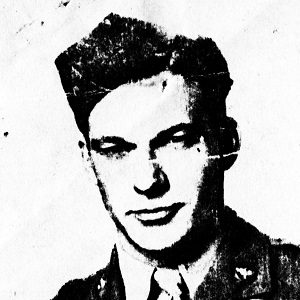
STAPLETON: I will never forget the longest night of my life. At 4:00 in the afternoon we took off from Espiritu Santo and we had put extra gas tanks in our airplanes and that same thirteen or fifteen airplanes flew from Espiritu Santo starting at 4:00 in the afternoon and we got to New Guinea at midnight and unloaded our personnel bombs on the Japanese who were bearing down on the 32nd Division from Wisconsin. And we pretty well knocked them out, knocked them back anyway so the 32nd could -- But that was Christmas Eve, 1942 and then to fly back from there, very weary, long eighteen hours in the air, got home in time for Christmas dinner. Long night. (Stapleton's complete interview)
Sharing a Meal with Strangers: Catherine Spain
SPAIN: From there they sent me to Bethesda Naval Hospital outside of Washington, D.C., for six weeks of training there. It was very basic medicine, and things like that. You didn't actually work on the wards. [inaudible] it was mostly school, all while you were there, [inaudible] medic and things like that, but it was six weeks of hard training there, and the very lovely place where we were staying and we happened to be there over the holidays and some of the people from Bethesda home were, people from Bethesda invited the girls to their homes for Christmas--
INTERVIEWER: Oh, that's nice.
SPAIN: --so two of my friends and I were invited to a lovely home for Christmas dinner. So, you know, the first Christmas away from home and-- (Spain's complete interview)
Waiting to Open Christmas Gifts: Steve House
HOUSE: Well, you know, there is. There was an incident I had, you know, when I told you my mom was kind of upset about me getting orders to go to Vietnam. Well, when I left, she didn't want to go to the airport. My dad took me to the airport and she said that, you know, she just didn't want to go because, you know, her brothers had been in World War II. And it was just some sad times, you know, and so she didn't want to go. So she said my goodbyes at home, went to the airport, got to Vietnam. And this we're talking about R and R, I'm getting ready to go on R & R, and my duffel bag was under my bunk and I hadn't seen it for, you know, seven months or so, however long it was [before??] I went on R & R. As I pulled the duffel bag. I'm rolling it down, getting ready to put some stuff in it. Here's a letter sitting in the bottom of the duffel bag, and it's a letter from my mom. And that was her letter to me. She didn't tell me that it was in there. I'm sure she just thought I'd see it, but I never did, I never noticed it. So I sit down and I read the letter and she's telling me about her brother in World War II and how he was supposed to come home one Christmas and he didn't. He was. He didn't get home. It was getting late and her mom wouldn't let any of the kids open the Christmas presents until he got home because he was supposed to be there. Well, he got wounded. He never made it and the information didn't get back to the family. So they waited a few days and then they got information that he'd been wounded. But it wasn't serious and you know, he'd be coming home soon. So it was, that letter was like that, she was telling me, but never told me about this before, and she was I was telling me to be be careful and be safe. And I remember I got a couple of tears in my eyes and as I read that--(House's complete interview)
Christmas Skit on the Imjin River: Terrance Larson
LARSON: RC-1 was outside of Paju-Ri. Okay. One thing I can say about Camp Custer had a church and our battalion supported an orphanage. We supported, though we were the only battalion that supported a complete orphanage by our, you know, contributions at pay time. And what we did at Camp Custer, they sent deuce and halfs every Sunday morning down to the orphanage and they brought the orphans back and they were our choir. And after service we would go outside of the church and the orphans would come out and they would select us and we would take them down to the EM Club, which was set up with sodas and cookies and sandwiches. And we would treat them to, you know, things that they weren't used to at all. But this one little girl always selected me, and she couldn't talk any English. But come Christmas time, she said they were going to do a program in our theater, and she tried to say what she was going to do. Well, she was a little rabbit in a in a Christmas skit. And um, see, I had no job back home and I had a daughter and anything I would have liked to brought her home. (Larson's complete interview)

